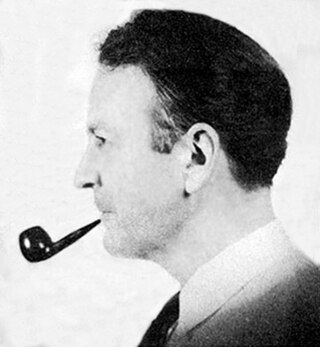
Raymond Thornton Chandler was an American-British novelist and screenwriter. In 1932, at the age of forty-four, Chandler became a detective fiction writer after losing his job as an oil company executive during the Great Depression. His first short story, "Blackmailers Don't Shoot", was published in 1933 in Black Mask, a popular pulp magazine. His first novel, The Big Sleep, was published in 1939. In addition to his short stories, Chandler published seven novels during his lifetime. All but Playback have been made into motion pictures, some more than once. In the year before his death, he was elected president of the Mystery Writers of America.

A whodunit is a complex plot-driven variety of detective fiction in which the puzzle regarding who committed the crime is the main focus. The reader or viewer is provided with the clues to the case, from which the identity of the perpetrator may be deduced before the story provides the revelation itself at its climax. The investigation is usually conducted by an eccentric, amateur, or semi-professional detective.

Samuel Dashiell Hammett was an American writer of hard-boiled detective novels and short stories. He was also a screenwriter and political activist. Among the characters he created are Sam Spade, Nick and Nora Charles, The Continental Op and the comic strip character Secret Agent X-9.
Michael Hammer is a fictional character created by the American author Mickey Spillane. Hammer debuted in the 1947 book I, the Jury. Hammer is a no-holds-barred private investigator whose love for his secretary Velda is outweighed only by his willingness to kill a killer. Hammer's best friend is Pat Chambers, Captain of NYPD Homicide. Hammer was a World War II army veteran who spent two years fighting jungle warfare in the Pacific Ocean theater of World War II against Japan.

Black Mask was a pulp magazine first published in April 1920 by the journalist H. L. Mencken and the drama critic George Jean Nathan. It is most well-known today for launching the hardboiled crime subgenre of mystery fiction, publishing now-classic works by Dashiell Hammett, Raymond Chandler, Erle Stanley Gardner, Cornell Woolrich, Paul Cain, Carroll John Daly, and others.
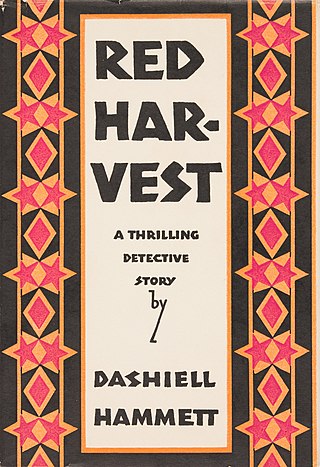
Red Harvest (1929) is a novel by American writer Dashiell Hammett. The story is narrated by the Continental Op, a frequent character in Hammett's fiction, much of which is drawn from his own experiences as an operative of the Pinkerton Detective Agency. The plot follows the Op's investigation of several murders amid a labor dispute in a corrupt Montana mining town. Some of the novel was inspired by the Anaconda Road massacre, a 1920 labor dispute in the mining town of Butte, Montana.
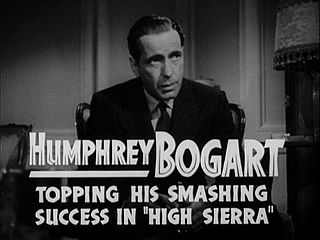
Sam Spade is a fictional character and the protagonist of Dashiell Hammett's 1930 novel The Maltese Falcon. Spade also appeared in four lesser-known short stories by Hammett.
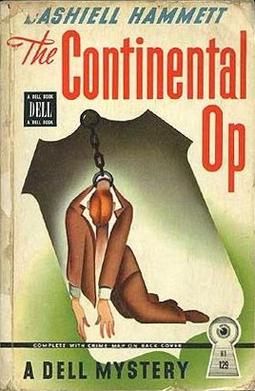
The Continental Op is a fictional character created by Dashiell Hammett. He is a private investigator employed as an operative of the Continental Detective Agency's San Francisco office. The stories are all told in the first person and his name is never given.
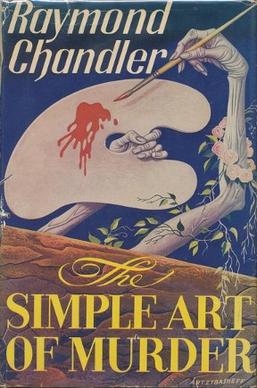
The Simple Art of Murder is the title of several quasi-connected publications by hard-boiled detective fiction author Raymond Chandler:
Hardboiled fiction is a literary genre that shares some of its characters and settings with crime fiction. The genre's typical protagonist is a detective who battles the violence of organized crime that flourished during Prohibition (1920–1933) and its aftermath, while dealing with a legal system that has become as corrupt as the organized crime itself. Rendered cynical by this cycle of violence, the detectives of hardboiled fiction are often antiheroes. Notable hardboiled detectives include Dick Tracy, Philip Marlowe, Nick Charles, Mike Hammer, Sam Spade, Lew Archer, Slam Bradley, and The Continental Op.
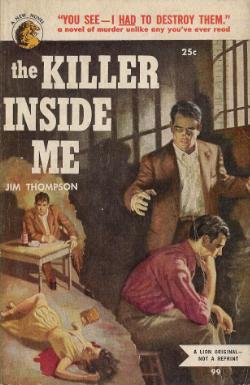
Noir fiction is a subgenre of crime fiction.
Michael Collins is the best-known pseudonym of Dennis Lynds, an American author who primarily wrote mystery fiction.

The Glass Key is a novel by American writer Dashiell Hammett. First published as a serial in Black Mask magazine in 1930, it then was collected in 1931. It tells the story of a gambler and racketeer, Ned Beaumont, whose devotion to Paul Madvig, a crooked political boss, leads him to investigate the murder of a local senator's son as a potential gang war brews. Hammett dedicated the novel to his onetime lover Nell Martin.
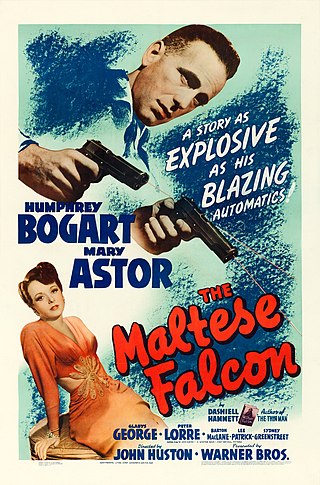
The Maltese Falcon is a 1941 American film noir in which a San Francisco private detective deals with three unscrupulous adventurers, all seeking a jewel-encrusted falcon statuette. Written and directed by John Huston in his directorial debut, the film was based on the 1930 novel The Maltese Falcon by Dashiell Hammett and is a remake of the 1931 film of the same name. It stars Humphrey Bogart as private investigator Sam Spade, Mary Astor as his femme fatale client, and as villains Peter Lorre and Sydney Greenstreet.
Vincent Calvino is a fictional Bangkok-based private eye created by Christopher G. Moore in the Vincent Calvino Private Eye series. Vincent Calvino first appeared in 1992 in Spirit House, the first novel in the series. His latest appearance is in Jumpers, the 16th novel in the series published in October 2016. "Hewn from the hard-boiled Dashiell Hammett/Raymond Chandler model, Calvino is a tough, somewhat tarnished hero with a heart of gold."

Pulp is the last completed novel by Los Angeles poet and writer Charles Bukowski. It was published in 1994, shortly before Bukowski's death. He began writing it in 1991 and encountered several problems during its creation. He fell ill during the spring of 1993, only three-quarters of the way through Pulp.
Carroll John Daly (1889–1958) was a writer of crime fiction. One of the earliest writers of hard-boiled fiction, he is best known for his detective character Race Williams, who appeared in a number of stories for Black Mask magazine in the 1920s.
The Maltese Falcon Society is an organization for admirers of Dashiell Hammett, his 1930 novel The Maltese Falcon, and hardboiled mystery books and writers in general. Founded in San Francisco in 1981, the organization is no longer active in the United States; however, a chapter in Japan has been active continuously since 1982. The Japanese branch of the society presents the Falcon Award, Japan's highest honor in the mystery field, to honor the best hardboiled mystery novel published in Japan.

The following is a list of published works by or about the American film director Woody Allen.
Nick Danger is a fictional character created by the comedy group The Firesign Theatre, portrayed by Phil Austin. Danger is a parody of the hard-boiled detective, and is often announced as "Nick Danger, Third Eye", a parody of the term private eye. Danger stories involve stereotypical film noir situations, including mistaken identity, betrayal, and femmes fatales. Danger originally appears on the 1969 album How Can You Be in Two Places at Once When You're Not Anywhere at All, and is reprised in the 1979 Nick Danger: The Case of the Missing Shoe, 1984 The Three Faces of Al, and 2001 The Bride of Firesign.
He's based on the [Dashiell] Hammett Sam Spade character, but as I got more into writing him over the years, he's become much more like [Philip] Marlowe. I love [Raymond] Chandler's writing.












